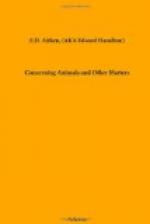All this time the Purbhoo was in the land, but insignificant. He had no sacred calling. Tradition assigned him a hybrid origin. He could not presume to be a warrior, because his mother was a shoodra, nor could he condescend to be a farmer, for his father was a kshutriya. So the gods had given him the pen, and he was a writer—not a secretary, but a humble quill-driver. But when the Portuguese and then the British came upon the scene, not ruling by word of mouth, like the native rajahs, but inditing their orders and keeping records, the Purbhoo saw an open door and went in.
Then the Brahmin woke up, for he saw that he was in evil case. The spirit of the British raj was falling like a blight and a pestilence upon the means by which he had lived, drying up the fountains of religious revenue and slowly but surely blighting the luxuriance of that pious liberality which always took the form of feeding holy men. He found that he must work for his bread whether he liked it or not, and the only implement of secular work that would not soil his priestly hand was the pen. And this was already taken up by the Purbhoo, who carried himself haughtily under the new regime and showed no mind to make way for the holier man. Hence sprang those bitter enmities and jealousies which have done so much to lighten the difficulties of our position.
The British Government has often been accused of acting on the maxim, Divide et impera. It is a libel. We do not divide, for there is no need. Division is already there. We have only to rejoice and rule. How well and justly we rule all the world knows, but only the initiated know how much we owe to the fact that the talents and energies which would otherwise be employed in thwarting our just intentions and phlebotomising the ryot are largely preoccupied with the more useful work of thwarting and undermining each other.
What could a collector do single-handed against a host of clerks and subordinate magistrates and petty officials of every grade, all armed with the awfulness of a heaven-born sanctity, all hedged round with the prestige of an ancient supremacy, endowed with a mole-like genius for underground work which the Englishman never fathoms, and all leagued together to suck to the uttermost the life blood of those inferior castes which were created expressly for their advantage?
He is working in a foreign language, among customs and ways of thought which it takes a lifetime to understand: they are using their mother tongue and handling matters that they have known from childhood. He cannot tell a lie and is ashamed to deceive: they are trained in a thrifty policy which saves the truth for a last resort in case everything else should fail. He would be helpless in their hands as a sucking child. But he knows they will do for him what he cannot do for himself. The Purbhoo will lie in wait for the Brahmin, and the Brahmin will keep his lynx eye on the Purbhoo. And woe to the one who trips first. So the collector arranges his men with judicious skill to the fostering of each other’s virtue, and the result is most gratifying. The country blesses his administration, and his subordinates are equally surprised and delighted at their own integrity.




